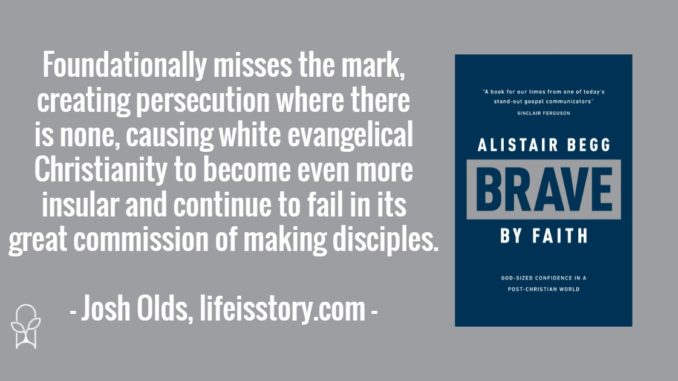
Also by this author: Brave by Faith: God-Sized Confidence in a Post-Christian World, The Christian Manifesto: Jesus’ Life-Changing Words from the Sermon on the Plain, C is for Christian: An A-Z Treasury of Who We Are in Christ, Let Earth Receive Her King: Daily Readings for Advent
Published by Good Book Company on May 1, 2021
Genres: Non-Fiction, Christian Life
Buy on Amazon
Goodreads

What does it look like to live with joy in a society that does not like what Christians believe, say, or do? It's tempting to grow angry, keep our heads down, retreat, or just give up altogether.
But this isn't the first time God's people have had to learn how to live in a pagan world that opposes God's rule. In this realistic yet positive book, renowned Bible teacher Alistair Begg examines the first seven chapters of Daniel to show us how to live bravely, confidently and obediently in an increasingly secular society.
Readers will see that God is powerful, God is sovereign, and that even in the face of circumstances that appear to be prevailing against his people, we may trust him entirely.
We can be as brave as Daniel, if we have faith in Daniel's God!
"The message of Daniel is incredibly relevant for us in our generation. Not because it maps out a strategy for how to deal with our new lack of status... or because Daniel was a great man and we need to follow his example. The reason is that it will help us to believe in Daniel's God." Alistair Begg, author.
Brave by Faith is subtitled God-sized Confidence in a Post-Christian World. The primary theme of Begg’s teaching is that, even as the world grows more secular, we should hold on to our faith because God is sovereign to see us through.
My concern with the book is how Begg presents Christianity as a victim of the “culture wars.” This starts in the introduction, entitled “The Wind Has Changed.” Begg writes that American Christians are beginning to find out “how it feels to be outsiders” and posits the life of Daniel as an example of how Christians are to live in a culture antithetical to their views.
This isn’t a new association. “Babylon” has long been used as a symbolic term for any non-Christian culture. Daniel (along with Hananiah, Azariah, and Mishael) has long been used an example of confronting non-Christian empires. But it is a bit dangerous to compare any modern Western nation—America, in particular—to Babylon. Christians in America enjoy unprecedented freedoms and political access. Evangelicals actually hold disproportionate political and cultural power in relation to their percentage of the population. It’s simply not an equitable comparison.
What Brave by Faith misses is why Daniel is in Babylon. The nation of Judah has been brought into captivity by the Babylonians as a direct result of God’s supernatural protection leaving them. One can look back to the prophet Amos—the earliest writing prophet—to see God’s condemnation of the empty religiosity and lack of justice that defined his people. God’s judgment of them for their behavior and lack of repentance was to be placed in Babylon.
The message that Christians need simply to hang on and keep doing what we’re doing fails to account for why we might be ended up in “Babylon” in the first place. The very point of Daniel is that he wasn’t continuing on in the religious tradition that put Israel in Babylon. Christians, if we truly want to understand why we have become a minority, need to look at why our faith is no longer compelling to the world.
Further, rather than lament our loss of political and social power, perhaps we should recognize that the Church is usually stronger when it is a prophetic minority. A book that is similar in topic, but completely opposite in tone is Onward by Russell Moore. Moore tackles most of the same cultural happenings that Begg does, but from a deeper and more nuanced perspective that accounts for white evangelical Christianity’s cultural failings through its quest for power.
Begg is clear, cogent, and straightforward. Brave by Faith is well-written, passionate, and intended to bring hope to a church that feels increasingly fearful—and is showing that fear through its actions. But I’m afraid it foundationally misses the mark, creating persecution where there is none, causing white evangelical Christianity to become even more insular and continue to fail in its great commission of making disciples.
